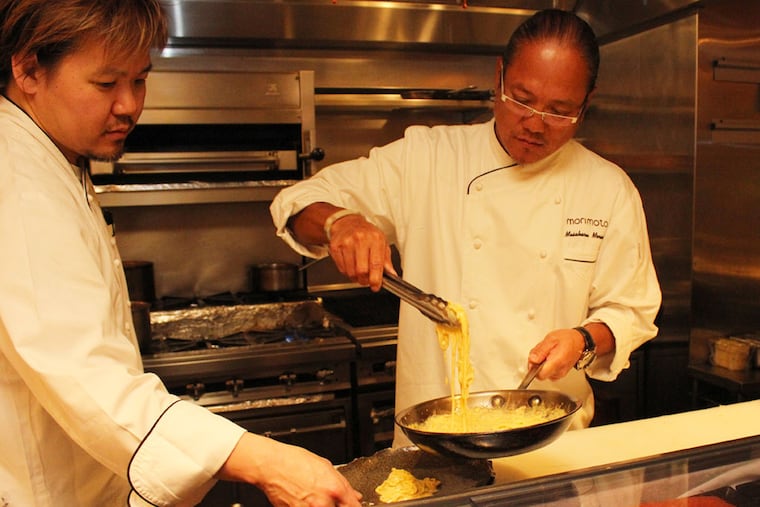Morimoto: From humble cook to superstar
In the flash of a long sushi knife, Philadelphia got its first Iron Chef 15 years ago today. That's when Masaharu Morimoto, already an international TV celebrity, teamed with Stephen Starr to open the Japanese chef's first signature restaurant, on Chestnu

In the flash of a long sushi knife, Philadelphia got its first Iron Chef 15 years ago today. That's when Masaharu Morimoto, already an international TV celebrity, teamed with Stephen Starr to open the Japanese chef's first signature restaurant, on Chestnut Street. With its undulating walls and wavy bamboo ceiling, its stellar omakase menus and sushi from rice polished to perfection, Morimoto set the local standard for modern Japanese cooking and dining glitz, and helped put Philly on the national restaurant map.
These days, the 61-year-old Morimoto has become a global sensation, with his own beers and knives, and 14 restaurants on multiple continents, including one that opened at the MGM Grand in Las Vegas last week as Morimoto, ever the showman, dismantled a 132-pound tuna into a 100-foot maki roll. With a new cookbook, Mastering the Art of Japanese Home Cooking (Ecco), Morimoto took a moment to reflect on his love of traditional Japanese flavors, the seasonality of fish, and the city where he got his start.
You're a busy man. How often do you revisit your flagship in Philadelphia?
My driver's license says New York, but I spend most of my time in airports and hotels. Sometimes I wake up and wonder, 'Where am I?' and need to look at my iPhone. But Philadelphia is still my Number One. I try to get there once a season. And my soul is still there.
Was Philly an important place in terms of finding your creative voice?
I think so. America in general is more receptive to creativity. And because we don't have some ingredients here, you need to learn to find a different way. I could not find a Japanese herb called kinome for a special bamboo shoot dish, so I used peppermint instead. The Japanese were like, "No, no, no!" But I said, "Yes! It's a different food, but it is good."
Is this new book an attempt to make Japanese cooking more accessible?
But you note in the book that your mom really wasn't such a great cook.
That's why I wanted to learn to cook myself. I once said that at a lecture in my hometown [of Hiroshima] not knowing she was in the audience, and my sister told me that made her cry. I meant it as a joke, because she tried her best and I respected her. But she took it seriously.
Many recipes in this book were inspired by your early days when, after abandoning your career as a baseball catcher, you worked four jobs (including paperboy and insurance broker) and cooked at a coffee shop. How did you evolve from that humble place into a master chef?
Well, in Japan you had to start on the bottom. You had to wash the dishes, clear the dishes, and bring the tea. You learn to respect each other, respect the fish, respect the cutting board, and respect the knife. I think that way now, and it makes sense to me emotionally. But the young generation has no patience. "I want to touch the tuna!" No, you're going to peel onions. People say a maki roll is a maki roll and sushi is sushi, but that's just not true.
What is the difference? And why does it take so long to master sushi?
Someone can learn the basic skills, no problem. But you can only touch a fish for one season a year. And fish are very seasonal. Like with mackerel, winter is the best season, when they are fattier and require more salt and vinegar in the marinade. In summer, we put less. Fattier fish get more wasabi between the fish and rice, and that can even vary from the front of the fish to the tail. Where does it come from? That also makes a difference - and not many sushi chefs know this. It takes time. So, two people can be making the same maki roll. But emotionally, they are different. And when you're making sushi by hand, especially at a counter, that can be very important.